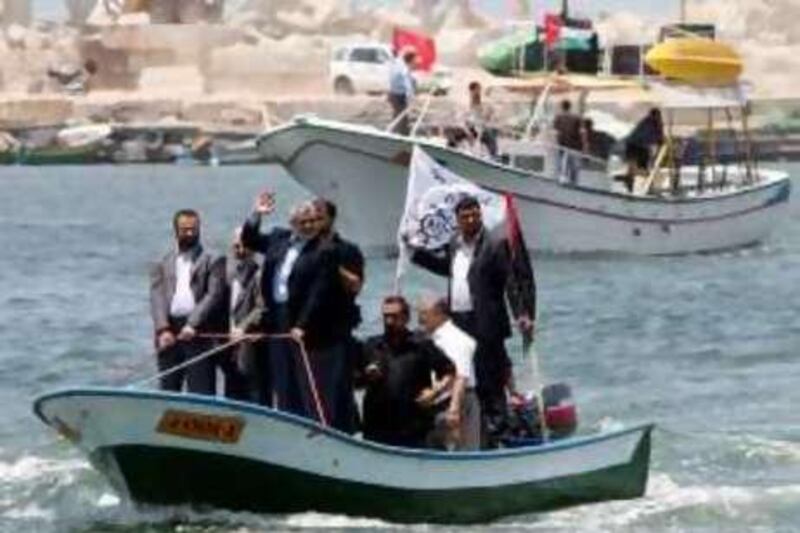RAMALLAH // A flotilla of boats carrying humanitarian aid and international activists was expected to try to reach Gaza last night, even as the Israeli navy was on standby to intercept and divert the eight vessels to the nearby port of Ashdod. The flotilla's organiser at sea said its mission was delayed because their boats were "tampered with," and had to stop in the eastern Mediterranean. Elize Ernshire of the Free Gaza Movement said two of the seven boats in the humanitarian aid operation had been "tampered with", forcing one to drop out and the other to pull into port in Turkish-held northern Cyprus for repairs.
"These boats had no previous mechanical problems and had undergone full [mechanical] surveys," Ms Ernshire said. One of the damaged boats transferred its passengers at sea, while the other pulled into Famagusta in the Turkish-held sector of the divided island and was expected to head back out to rejoin the flotilla. She said the boats would head off toward the Palestinian territory aiming to arrive at around midday today.
Ismail Haniyeh, the Hamas prime minister of Gaza, said yesterday that if Israel diverted the flotilla, which is carrying 10,000 tonnes of aid, it would be a victory for Palestinians. "The flotilla's message is clear and it will reach the entire world," Mr Haniyeh said yesterday morning during a press conference at the port where the ships are meant to dock. "The meaning of the flotilla is that the entire world opposes the siege on the Gaza Strip, and if Israel behaves like pirates and sea-terrorists, we will win."
Israel has vowed to prevent the boats - carrying some 600 activists from a dozen different countries, including Israelis - from reaching Gaza, by intercepting them if they enter territorial waters outside Gaza and towing them to Ashdod. Israel controls Gaza's territorial waters and prevents any traffic to and from the impoverished strip of land. For the past five years, the Israeli navy has also imposed strict limits on Gazan boats, which are now not permitted further out than 5.6km, in contravention of the Oslo Accords, which stipulate a 22km fishing zone for Gazan vessels.
On Friday, Avigdor Lieberman, the Israeli foreign minister, denounced the so-called "freedom flotilla" as a threat to Israel's sovereignty, and said Israel would not allow the eight boats to enter Gaza. "The aid convoy is violent propaganda against Israel, and Israel will not allow its sovereignty to be threatened in any way, in any place, land, air or sea," Mr Lieberman said. He also denied that there was a humanitarian crisis in Gaza, saying that, "despite Hamas war crimes against Israeli citizens and the thousands of rockets fired at Israeli towns, Israel continues to respond in the most humane way possible."
Rocket fire from Gaza has all but stopped in recent months, as Hamas has tried to enforce an unofficial ceasefire with Israel. Mr Lieberman's remarks rejecting a humanitarian crisis in Gaza, meanwhile, appear to be a new attempt by the Israeli government to manage international perceptions of the situation in Gaza. Last week, the Israeli government's press office released a statement denying any humanitarian emergency in Gaza, citing the existence of a high-end restaurant in Gaza City with a menu that includes steak and fresh fish.
But the humanitarian crisis in Gaza is evident to anyone who has visited, and the Israeli government's new PR effort also flies in the face of international assessments of the situation.
The UN recently reported that some 60 per cent of Gazan households are "food insecure" as a direct consequence of the Israeli ban on all but the most basic humanitarian goods from entering Gaza.
okarmi@thenational.ae
* With additional reporting by Agence France-Presse





